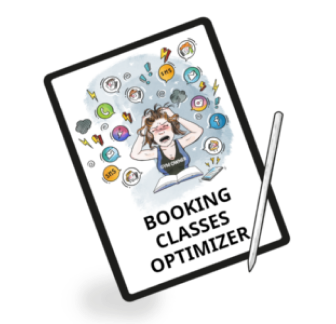If you are a fitness instructor planning to start your own business and you want to follow interesting new trends, this idea is for you.
Mobile gym business is an idea for a new fitness offer. You can address it to people who avoid gyms because of crowds or do not have time to visit it during a busy day.
It’s a smart approach if you’re wondering how to make money in fitness while staying flexible and independent. If you like traveling, contact with people and want to earn money on your skills in the fitness industry, read on.

Key Takeaways
- Are gyms going out of business? Yes, they are if they aren't flexible and open to new market requirements - like customer preferences. This is where the mobile gym business comes into play.
- Mobile fitness businesses can look different - coming to clients at their homes or offices or having a special car, which allows you to train wherever you park it.
- The first steps to starting a mobile fitness business are creating a business plan, obtaining a fitness teaching qualification, and making initial investments in a car and/or equipment and advertising.
- Mobile gym businesses can thrive by focusing on delivering convenience, personalized fitness, and creating a strong, recognizable brand presence in the community.

How to Start a Mobile Fitness Business in a Nutshell
- Conduct Market Research
- Develop a Business Plan
- Obtain Necessary Certifications and Skills
- Choose a Business Structure and Register Your Business
- Acquire Equipment and a Mobile Setup
- Get Insurance
- Develop a Pricing Structure
- Set Up a Booking and Payment System
- Market Your Business
- Build Relationships and Retain Clients

10 Steps to Start a Mobile Fitness Business
Starting a mobile gym business requires planning, investment, and a clear strategy to meet customer needs. Here are 10 essential steps to get your mobile gym business up and running.

Step 1. Conduct Market Research
- Identify your mobile gym target market: Determine if you want to cater to busy professionals, stay-at-home parents, fitness beginners, or corporate groups.
- Analyze competition: Check if other mobile gym businesses operate in your area and identify gaps in their services.
- Determine service demand: Assess the demand for at-home fitness services or mobile fitness business vehicles in your location.
Step 2. Develop a Mobile Gym Business Plan
- Define your gym business model: Will you offer personal training sessions, group workouts, or corporate fitness packages? Will you visit clients’ homes or set up a mobile gym vehicle?
- Set financial goals: Estimate startup costs, operational expenses, and expected revenue. Plan pricing strategies for different packages.
- Outline your fitness marketing and growth strategies: Include details on customer acquisition and retention, brand promotion, and future business expansion.
Step 3. Obtain Necessary Certifications and Skills
- Personal training certification: Ensure you or your trainers are certified by a recognized organization (e.g., ACE, NASM, or ISSA).
- Specializations: Consider getting additional certifications for niche markets, like senior fitness, strength training, or yoga.
- First aid and CPR: Safety is critical, so ensure you have basic first aid and CPR certification.
Step 4. Choose a Business Structure and Register Your Business
- Select a legal structure: Decide whether to register your mobile fitness business as a sole proprietorship, LLC, or corporation. Consult a legal advisor or accountant for guidance. Read more about any gym business model.
- Obtain licenses and permits: Depending on your location, you may need specific permits to operate a mobile gym business, particularly if you plan to work in public spaces.
- Register your business name: Choose a memorable and marketable business name. Gym names should be registered with your local business authority.
Step 5. Acquire Equipment and a Mobile Setup
- Create a list of essential equipment: This could include resistance bands, dumbbells, kettlebells, mats, and other portable fitness tools. For a mobile gym vehicle, you may also need larger equipment like stationary bikes or pull-up bars.
- Consider a vehicle: If using a custom van, ensure it is equipped with storage for your equipment and easy-to-set-up training stations. Factor in modifications for safety and convenience.
- Invest in quality and portable gear: Choose durable, space-saving equipment that can easily be transported and stored.
Step 6. Get Gym Insurance
- Liability insurance: Protect your business in case of client injury during training sessions.
- Vehicle insurance: If you’re using a van or truck, make sure it’s covered under commercial vehicle insurance.
- Equipment insurance: Cover the cost of your gym equipment in case of damage or theft.
Step 7. Develop a Pricing Structure
- Package pricing: Offer different packages for individual clients, group training, and corporate wellness programs. Consider offering discounts for longer-term commitments.
- Service flexibility: Price your services based on location (home visits, outdoor parks, corporate offices) and the type of workout (personal training vs. group sessions).
- Subscription model: Consider offering monthly memberships or packages to build recurring revenue (read more on how to calculate monthly recurring revenue).
- Read more about gym pricing strategy.
Step 8. Set Up a Booking and Payment System
- Online booking system: Use a gym software or apps like WodGuru to allow clients to book and pay for sessions online.
- Gym payment systems: Set up multiple payment options (credit card, digital wallets, bank transfers) for convenience.
- Client management: Use gym CRM tools to track client progress, manage schedules, and maintain client relationships.
Step 9. Market Your Business
- Build a website: Create a professional website showcasing your services, pricing, and contact information. Include a blog or fitness tips section to drive traffic.
- Gym social media marketing: Use platforms like Instagram, Facebook, and LinkedIn to promote your services, share client success stories, and post fitness content.
- Partner with local businesses: Build partnerships with corporate offices, schools, or wellness centers to promote your mobile gym services.
- Offer free trials or promotions: Make the most of word-of-mouth by offering initial free sessions or discounts for new clients or referrals. You can donate free training sessions to encourage new clients too.
Step 10. Build Relationships and Retain Clients
- Provide excellent customer service: Personalize your services to each client’s fitness level and goals, ensuring a positive experience.
- Gather feedback: Regularly ask for feedback to improve your offerings and keep your clients engaged.
- Create a loyalty program: Offer rewards, discounts, or exclusive access to new programs for gym member retention – repeat clients to build long-term relationships.
How to find Clients as an Owner of a Mobile Business
To find clients for a mobile fitness business, focus on a combination of smart marketing, technology, and partnerships. Here’s a concise strategy and gym promotion ideas:
1. Use Marketing Software
- Attract and retain members with gym marketing software tools. Analyze customer data and create effective campaigns.

Manage your gym
like a pro
Get more online bookings and increase your gym profit
2. Develop or Buy a Fitness App
- Create a fitness app to offer clients personalized workout plans, progress tracking, and exclusive content.

3. Build an Online Presence
- Create a professional website and optimize it for local SEO. Set up a Google My Business profile to increase visibility and encourage reviews.
- Your brand should be recognizable, but do you already have the ideas for your personal trainer business names to choose the best one from? If not, start now!
4. Use Social Media Marketing
- Post fitness tips, success stories, and challenges on platforms like Instagram or TikTok. Use hashtags and collaborate with local fitness influencers to grow your reach.
5. Offer Free Trials
- Host free outdoor classes to attract potential clients to your mobile fitness business, showcasing your training style and offering discounts for new sign-ups.
6. Partner with Local Businesses
- Offer corporate wellness programs and collaborate with local wellness centers or gyms to expand your client base through partnerships.
7. Use Paid Ads
- Run targeted ads on Google and social media, focusing on your local area and retargeting users who’ve engaged with your website.
8. Introduce Referral and Loyalty Programs
- Encourage word-of-mouth referrals by offering discounts or free sessions. Set up a loyalty program to reward repeat clients.
9. Join Local Events
- Attend or sponsor fitness events, host workshops, or run challenges in your community to showcase your expertise and meet potential clients.
Mobile Gym Business - Two Ways of Understanding The Idea
Opening a gym in the mobile fitness industry offers various opportunities. Different approaches can reach a wide range of clients who value flexibility and time savings. Two main models stand out:
- visiting clients at their homes or workplaces
- using a custom vehicle equipped with gym equipment.
Both approaches offer unique benefits and can be tailored to different client preferences.
1. Visiting Clients at Home or at Their Workplace
In this model, a personal trainer goes directly to the client’s home or their place of work. This option is very convenient for individuals with busy schedules who don’t have time to travel to a gym. It’s also for fitness enthusiasts who prefer exercising in the comfort of their home or office.

2. Custom Vehicle Equipped with Gym Equipment
The second approach involves having a specially designed van or truck that can be set up as a gym on-site, offering workouts outdoors or even in private parking spaces. The vehicle is equipped with various fitness equipment, from dumbbells and exercise mats to more advanced gear like kettlebells, stationary bikes, and even small pull-up stations.

Two Approaches – Two Earning Opportunities
Both ways of understanding the idea of mobile gym business offer unique advantages and cater to different client needs.
Visiting clients at their homes or workplaces is ideal for those who value privacy and time savings.
A mobile gym vehicle provides a more comprehensive, mobile solution for people who want access to a full range of fitness equipment without visiting a traditional gym.
Benefits and Challenges of Mobile Gym Business
Visiting Clients at Home or in the Office
Benefits:
- Personalization: The workouts are customized to the client’s needs, taking into account the available space, equipment, and fitness goals. Small group sessions are also possible, for example, colleagues working out together in an office.
- Time savings: Clients save time by not needing to commute, which is one of the main reasons many people skip gym visits.
- Location flexibility: Trainers can adjust to the client’s physical location, increasing the convenience and availability of the service.
- Close interaction: Training in a more intimate environment helps build a stronger relationship between the trainer and the client, allowing for more personalized attention and progress tracking.

Challenges:
- Limited equipment: Trainers in their mobile business may have to rely on the client’s home equipment or bring only a limited amount of gear, which restricts the variety and intensity of workouts.
- Logistics: Traveling between clients can be time-consuming and requires careful route planning, limiting the number of sessions per day.
- Booking and Scheduling: Booking meetings does not take place in the gym, so you must use remote methods. Class booking software will come in handy here.
Mobile Fitness Business Car
Benefits:
- Full equipment mobility: Full set of professional equipment on hand, allowing for a complete strength, cardio, or interval workout.
- Uniqueness: This type of service is less common, making the business stand out in the market. It attracts clients looking for innovative solutions.
- Training in diverse locations: Clients can choose to work out at home, at work, outdoors, or even in a local parking lot. The vehicle, designed as a mobile gym, offers more comfort than home settings.
- Fewer equipment limitations: With a dedicated vehicle, much more equipment can be transported than what a trainer could bring for a session at a client’s home or office.

Challenges:
- High initial investment: The upfront costs of purchasing and customizing the vehicle, along with the required equipment, can be substantial.
- Logistics and maintenance: A mobile gym requires regular vehicle maintenance, any car trouble could result in canceled sessions and lost clients. Mobile fitness equipment needs to be well-maintained too.
- Parking space: Depending on the location, finding a suitable spot to park the vehicle and set up the equipment might be challenging, especially in urban areas with limited parking options.
- Legal regulations: Depending on local legal conditions, it may not always be possible to park in a given location and conduct classes. You must be prepared for this and have knowledge of local regulations.
- Planning and arranging training sessions. Due to the unusual type of service, clients may want to be very flexible in arranging appointments. To convince them to be regular and demand systematicity, a gym membership app will come in handy.
An optimal solution could combine both models depending on client demand and available resources, offering flexibility in adapting services to different scenarios.
Popular Mobile Fitness Business Brand & What to Learn From Them
One of the most prominent mobile gym brands is GYMGUYZ, founded by Josh York. It offers in-home personal training by bringing fitness equipment and certified personal trainers directly to clients.
GYMGUYZ operates a fleet of branded vehicles stocked with a wide variety of equipment, allowing trainers to provide customized workouts tailored to individual fitness goals. The company has expanded rapidly through franchising, growing its presence in the U.S. and internationally.
Key characteristics of GYMGUYZ include:
- On-Demand Services: Clients can schedule sessions at their convenience, emphasizing flexibility.
- Personalization: They tailor workout plans to each client’s fitness level and goals.
- Convenience: The mobile aspect eliminates the need for clients to visit a gym, making it a more accessible option.
Future mobile business owners can learn several lessons from GYMGUYZ:
- Emphasize Convenience and Personalization: Providing tailored, flexible fitness solutions meets modern consumer demand for convenience and customized experiences.
- Franchising for Growth: GYMGUYZ has successfully expanded through franchising. Willing to own a gym franchise could be a model for growth if scaling your business is a goal.
- Strong Branding: The GYMGUYZ vehicles are highly visible, helping to promote the brand and build recognition in local communities, which is key for a mobile business.

FAQ
Mobile gyms are customized cars. They offer the right equipment needed for a comprehensive workout, from weights to exercise machines, both for individual sessions and inviting groups. It is a convenient way to maintain a client’s fitness routine, especially when they’re constantly on the move.
Yes, a mobile fitness business can be profitable due to lower costs, as it avoids the expenses of running a physical location. You can charge premium prices for the convenience of in-home or on-site fitness services, attracting busy clients willing to pay more. High customer retention through personalized individual personal training programs and scalability (more trainers or group sessions) also boosts profitability.
It is more than a traditional trailer setup. In business contexts, particularly mobile services like mobile gyms, it could imply exploring more innovative ways of delivering services than simply using a trailer to transport equipment. A mobile gym trailer called Beaver has all sides foldable and can accommodate even advanced exercise equipment.





